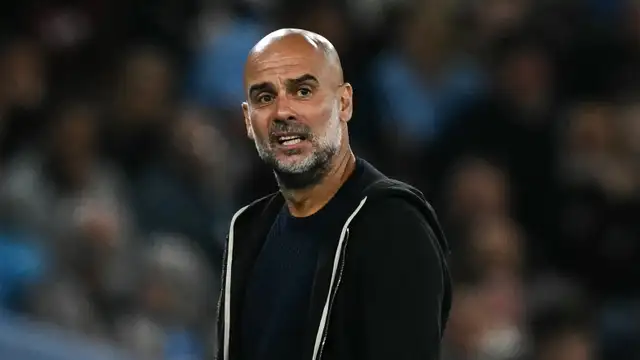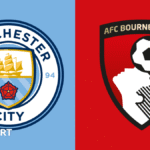‘Impossible for my soul’ – Pep Guardiola sensationally vows to QUIT Man City if squad size is not reduced for next season

In a stunning development that has sent shockwaves through the football world, Manchester City manager Pep Guardiola has issued what amounts to an ultimatum to the club’s hierarchy: reduce the size of the squad or he will walk away. This remarkable declaration came in the aftermath of City’s 3-1 victory over Bournemouth on Tuesday, a match that should have been remembered as Kevin De Bruyne’s farewell appearance at the Etihad Stadium but will now be overshadowed by Guardiola’s bombshell announcement.
The Manager’s Impassioned Plea
Speaking with characteristic intensity and emotional transparency following the midweek fixture, Guardiola laid bare his feelings on what has clearly become a matter of principle for the decorated tactician. “I said to the club I don’t want that. I don’t want to leave five or six players in the tribune. I don’t want that. I will quit,” declared the Spaniard, his voice carrying the weight of conviction.
The 54-year-old manager, who recently extended his contract with the Citizens until 2027, expressed profound discomfort at the prospect of repeatedly leaving talented professionals out of matchday squads. The Bournemouth game itself provided a vivid illustration of his dilemma, with promising talents James McAtee, Savinho, and homegrown product Rico Lewis all omitted from the matchday 20.
“It’s impossible for my soul to give [leave] my players in the tribune, that they cannot play,” Guardiola continued, offering a glimpse into the emotional burden he carries as the steward of such a talent-laden squad. His comments reflect a deeply held philosophical position that extends beyond tactical considerations into the realm of personal ethics and human management.
For Guardiola, the issue appears non-negotiable. “I don’t want to have 24, 25, 26 players when everyone is fit. If I have injuries, unlucky. We have some players from the academy and we do it,” he stated firmly, articulating a preference for a leaner playing group supplemented by youth when necessary.
The Human Dimension
Perhaps most revealing was Guardiola’s reference to the “soul of the team” and the importance of connection between squad members—qualities he suggested have diminished during the current campaign. “[We] cannot sustain for the emotion of the club, the soul of the team, create another connection with each other that this season we lost it a bit,” he observed, hinting at an erosion of the collective spirit that has been instrumental to City’s unprecedented success during his tenure.
This perspective offers valuable insight into Guardiola’s management philosophy, which has always prioritized harmony and cohesion as foundational elements of team success. The former Barcelona and Bayern Munich coach appears to believe that maintaining too large a squad inevitably creates disharmony and damages the interpersonal dynamics essential to sustained excellence.
His stance also reflects a compassionate understanding of the professional footballer’s mindset. Elite players train relentlessly throughout the week with the primary motivation of showcasing their talents on matchday. The psychological impact of regular exclusion from matchday squads can be profound, affecting morale, motivation, and ultimately performance levels when opportunities do arise.
Timing and Context
The timing of Guardiola’s proclamation is particularly significant, coming as it does at the conclusion of a season that, by Manchester City’s elevated standards, might be considered underwhelming. While a third-place Premier League finish and Champions League qualification would represent remarkable success for most clubs, it marks a regression for a team that has dominated English football so comprehensively in recent years.
City’s FA Cup final defeat to Crystal Palace earlier this month denied them another piece of silverware and may have catalyzed this moment of reflection from Guardiola. The club now finds itself at something of a crossroads, with an aging core of players who have delivered unprecedented success and a new generation of talent pushing for regular inclusion.
The presence of Rodri in the lineup against Bournemouth following his recovery from a serious knee injury served as a reminder of the depth of quality available to Guardiola. When fully fit, City’s squad contains an embarrassment of riches across all positions, creating the selection headaches that have prompted this extraordinary ultimatum.
Implications for Manchester City’s Future
Guardiola’s comments have profound implications for City’s transfer strategy and squad planning over the coming months. The club has historically operated with a robust squad to compete across multiple competitions, but this approach now appears to be in direct conflict with their manager’s vision.
The summer transfer window will be pivotal. City must now balance their ambitions across domestic and European fronts with the need to maintain a harmonious dressing room and, crucially, keep their transformative manager satisfied. This may necessitate difficult decisions regarding player departures, with established stars potentially moving on to facilitate the streamlining Guardiola desires.
Technical director Txiki Begiristain and chairman Khaldoon Al Mubarak face a delicate balancing act. They must respect Guardiola’s wishes while ensuring the club remains equipped to challenge for major honors. The manager’s contract extension last year demonstrated City’s commitment to the Guardiola project, but this latest development suggests that continuation is conditional.
The situation is complicated by City’s business model, which has included strategic player acquisition with an eye toward future transfer value. A reduction in squad size potentially impacts this aspect of their operation, though Guardiola’s emphasis on academy integration may offer a partial solution.
Guardiola’s Legacy and Future
Since arriving at Manchester City in 2016, Guardiola has transformed the club into a global powerhouse, implementing a distinctive playing philosophy while delivering consistent success. His impact extends beyond trophies to encompass a paradigm shift in how English football conceptualizes the game.
The prospect of his premature departure would represent a seismic blow to City’s long-term project. Beyond the immediate sporting implications, Guardiola’s presence has enhanced the club’s prestige and attractiveness to elite players. His coaching reputation remains undiminished despite this season’s relative disappointments.
Should City fail to meet his demands regarding squad size, potential destinations for Guardiola would not be lacking. National team management has been mooted as a possible next step in his distinguished career, while elite European clubs would undoubtedly queue for his services.
Perhaps most striking about this situation is Guardiola’s willingness to walk away from a position of extraordinary privilege and financial security on a matter of principle. In an era where cynicism about football’s soul often prevails, his stance offers a refreshing counterpoint—a reminder that certain values transcend material considerations.
The Broader Football Context
Guardiola’s comments also intersect with wider debates about squad sizes and player welfare in modern football. With congested fixtures lists and increasing physical demands, many clubs have expanded their playing groups to manage workloads and maintain competitiveness across multiple competitions.
However, this expansion creates its own challenges. Beyond Guardiola’s concerns about team cohesion and player happiness, there are legitimate questions about career development, particularly for younger professionals who find themselves on the fringes of bloated squads.
The City manager’s stance aligns with a growing perspective that leaner, more focused groups might better serve both collective ambitions and individual development. Rather than stockpiling talent, this philosophy advocates for more strategic squad construction and greater integration between first-team and academy structures.
The football authorities’ role in this equation cannot be overlooked. UEFA and FIFA’s continued expansion of competitions places additional strain on players and contributes to the perceived need for larger squads. Guardiola’s ultimatum might indirectly serve as a critique of this unsustainable trajectory.
The Final Stretch
As Manchester City prepare for their season finale against Fulham on Sunday, Guardiola’s bombshell adds an unexpected layer of intrigue to what might otherwise have been a relatively inconsequential fixture. The manager’s demeanor and any further comments will be scrutinized for indications about his resolve on this matter.
City’s third-place league position represents a regression from recent campaigns, though Champions League qualification has been secured. The return of influential midfielder Rodri provides a boost heading into the summer, but the focus now inevitably shifts to the boardroom rather than the pitch.
How the club’s hierarchy responds to Guardiola’s ultimatum will reveal much about the power dynamics at the Etihad and the direction of the project moving forward. While the Spaniard’s contract runs until 2027, recent events demonstrate that paper agreements can quickly become irrelevant when philosophical differences emerge.
A Summer of Soul-Searching
As the Premier League season concludes and attention turns to the European Championships, Manchester City face a summer of profound introspection. What began as a rebuilding phase has now evolved into something potentially more fundamental—a reassessment of the club’s very approach to squad construction and management.
Guardiola’s intervention ensures that City’s transfer activity will be among the most closely watched storylines of the window. Every arrival and departure will be interpreted through the prism of his ultimatum, with implications for the club’s immediate competitive prospects and long-term stability.
The resolution of this situation will resonate beyond Manchester, potentially influencing how other elite clubs approach squad building. Guardiola has often been a trendsetter during his managerial career, and his principled stance on this issue may inspire broader reconsideration of bloated squads across European football.
For the players themselves, uncertainty prevails. Those currently on the fringes face an anxious wait to determine whether paths to regular inclusion might emerge, either at City or elsewhere. Even established stars cannot feel entirely secure given the potential for significant restructuring.
Conclusion
Pep Guardiola’s remarkable ultimatum to Manchester City represents one of the most significant challenges to the club’s hierarchy since the transformative Abu Dhabi investment began in 2008. It pits the desires of football’s most coveted coach against the established operational model of one of the world’s wealthiest clubs.
The essence of Guardiola’s position appears to be that certain principles—respect for players’ dignity, preserving team cohesion, and maintaining authentic connection within the group—must take precedence over the security that comes with abundant squad depth. It is a stance that reveals much about his character and philosophy beyond tactical innovations.
As Manchester City conclude this transitional season against Fulham, the clock begins ticking on what promises to be a pivotal summer. The club must navigate these uncharted waters carefully, balancing competitive ambition with the imperative of retaining the architect of their golden era.
What began with a post-match press conference has evolved into a moment of reckoning for Manchester City Football Club. The resolution of this tension between manager and model will shape not just City’s immediate future but potentially reset expectations around squad management throughout elite football.
For Guardiola himself, this stance reinforces his reputation as a principled idealist in a sport increasingly dominated by pragmatic considerations. Whether his ultimatum leads to reconciliation or separation, it stands as testimony to a philosophy that extends beyond systems and structures to encompass fundamental human values.















